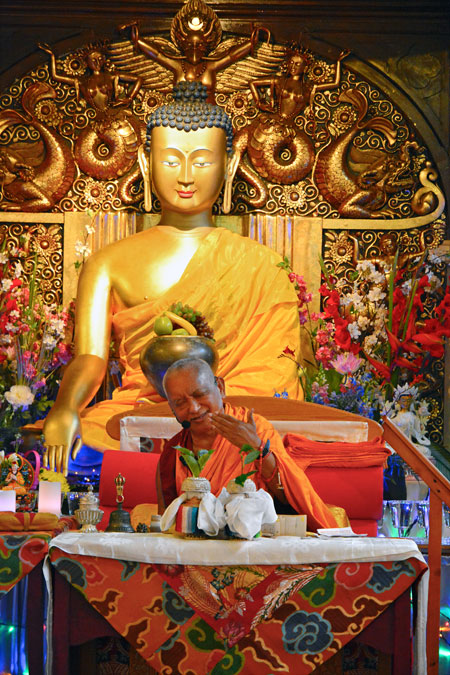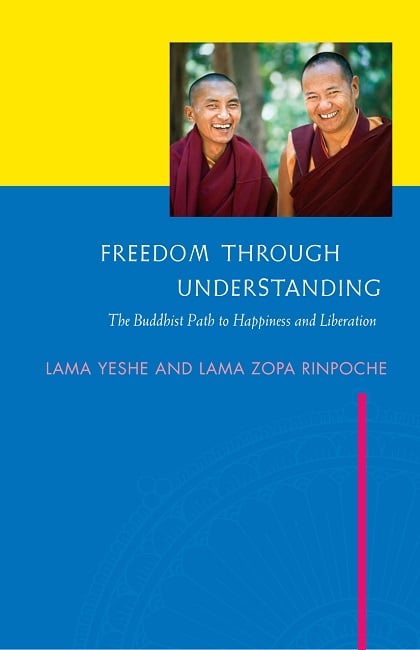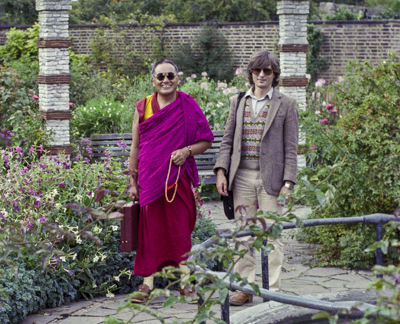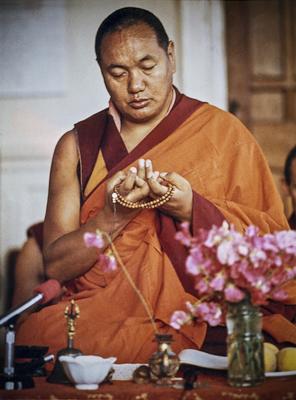Dear Friends,
Thank you so much for your interest in the Lama Yeshe Wisdom Archive and for subscribing to our monthly eletter. Please feel free to share this eletter on social media or anywhere else. We would love more people to see it!
And thank you to those of you who volunteered to test run the forthcoming Lamrim Year Companion, the free web application based upon the very popular LYWA free book, Lamrim Year. We received very helpful feedback, and are making final updates before launching in mid-October. We’ll be sending a special mailing to all of you when it is ready to go!
Read on for more examples of what your support allows us to do.
From the Video Archive: On Refuge and the Mind
This month from the video archive Lama Yeshe gives a clean-clear explanation of the mind as integral to the individualized practice of taking refuge in the Buddha, Dharma and Sangha. These teachings were hosted by Maitreya Instituut, Emst, the Netherlands in October, 1980.
Visit and subscribe to the LYWA YouTube channel to view more videos freely available from our archive. See also the FPMT YouTube channel for many more videos of Lama Zopa Rinpoche’s teachings.
On the LYWA Podcast: The Meaning of Secret Mantra
 The meaning of the word “mantra” includes the whole path to enlightenment.
The meaning of the word “mantra” includes the whole path to enlightenment.
-Lama Zopa Rinpoche
This month on the LYWA podcast, Lama Zopa Rinpoche discusses the use of mantra in Highest Yoga Tantra and explains how our minds should approach the practice of the mantra of Chenrezig. These teachings were given at the Twenty-Eighth Kopan Meditation Course in November 1995. Read along with the transcript on our website here.
You may also want to read Lama Zopa Rinpoche's The Power of Mantra, a Wisdom Publication, which explains why we need different mantras, how each mantra works, what their importance and power is, and how to practice them.
The LYWA podcast contains hundreds of hours of audio, each with links to the accompanying lightly edited transcripts. See the LYWA podcast page to search or browse the entire collection by topic or date, and for easy instructions on how to subscribe.
WHAT'S NEW ON OUR WEBSITE
 This month we have a new free audiobook, Sun of Devotion, Stream of Blessings, to share with you. It's now available for listening on Google Play, and in our effort to make these free audiobooks more accessible, especially for people unable to access Google Play, you can also listen to Sun of Devotion, Stream of Blessings on the LYWA Youtube channel.
This month we have a new free audiobook, Sun of Devotion, Stream of Blessings, to share with you. It's now available for listening on Google Play, and in our effort to make these free audiobooks more accessible, especially for people unable to access Google Play, you can also listen to Sun of Devotion, Stream of Blessings on the LYWA Youtube channel.
You can check out the entire LYWA audiobook catalog here, which includes some of our most popular books by Lama Yeshe and Lama Zopa Rinpoche, now available as free audiobooks from Google Play and titles for purchase from Audible.
We also want to remind Members (and future Members!) that we are now offering a selection of free audiobooks to LYWA Members in MP3 format. This means Members can listen offline to the audiobooks on any MP3 player. The audiobooks are auto-narrated by a digital voice and you can choose between two narrators and select the narration style which appeals to you most. Visit our Membership page to find out more about becoming a member and to find links to the Members Area library of ebooks and audiobooks.
Every month we share new advices for Lama Zopa Rinpoche’s Online Advice Book, adding more than 100 new entries every year on a variety of topics. There are now more than 2,200 of Rinpoche’s precious advices online.
- Criticizing the Guru and Causing Problems at the Dharma Center: This long letter was sent to a student who had confessed to criticizing Rinpoche when traveling in India and Nepal. The student also felt they were a troublemaker at the Dharma center and had caused problems for the director and other students. For this, the student was sorry and asked how to purify the karma.
- Why Vajrasattva Practice Is So Important: In this letter, Rinpoche recommends purifying negative karma with daily Vajrasattva practice, just as the wise ones have done. This is the second part of the long letter sent to a student who had criticized Rinpoche and caused problems at the Dharma center.
- Opening the Door to Peace: A student was upset because her partner had gone to live with someone else. Rinpoche advised that we have all been suffering from beginningless rebirths and the key to peace and happiness is giving up the self-cherishing mind.
- Generation and Completion Stage Practices: Rinpoche offered this advice about the correct way to practice Highest Yoga Tantra, by first accomplishing generation stage and then practicing completion stage. Rinpoche also emphasized the importance of lamrim study and practice.
You can always find a list of all the newly posted advices from Lama Zopa Rinpoche on our website.
Coming Soon: More Popular LYWA Titles
 We are happy to report that we are reprinting a number of our most popular titles! We are replenishing our stock of Joy of Compassion, Peaceful Stillness of the Silent Mind, Ego, Attachment and Liberation, Freedom Through Understanding as well as Enjoy Life Liberated from the Inner Prison which is already in hand. We now have over 840,000 copies of our books in print! Wow, wow, wow!
We are happy to report that we are reprinting a number of our most popular titles! We are replenishing our stock of Joy of Compassion, Peaceful Stillness of the Silent Mind, Ego, Attachment and Liberation, Freedom Through Understanding as well as Enjoy Life Liberated from the Inner Prison which is already in hand. We now have over 840,000 copies of our books in print! Wow, wow, wow!
And we couldn’t achieve our mission to make the Dharma available to everyone everywhere without your support. If you would like to donate towards these reprints, you can do so here.
Thanks again for your interest and support. We couldn’t do it without you!
Big love,

Nick Ribush
Director
THIS MONTH'S TEACHING: Teaching Dharma to Westerners
 Geoff Jukes. Do you see, Lama, a form of Western Buddhism evolving in the way that Indian Buddhism changed when it moved into other cultures such as Tibet, China, Japan, Thailand and so forth? Do you see Tibetan Buddhism being readily absorbed into a Western environment in the way that Indian Buddhism was absorbed into Tibetan culture?
Geoff Jukes. Do you see, Lama, a form of Western Buddhism evolving in the way that Indian Buddhism changed when it moved into other cultures such as Tibet, China, Japan, Thailand and so forth? Do you see Tibetan Buddhism being readily absorbed into a Western environment in the way that Indian Buddhism was absorbed into Tibetan culture?
Lama. Well, I tell you, one of my great pleasures in life is first teaching the essence of Buddhism and then seeing how we can put it into a Western cultural environment. Why is that? I truly believe if somebody understands the essence of the universal teaching and practices that, it is much more powerful than another person interpreting the teaching as merely cultural and then taking that as part of their own culture. That’s a sloppy mind. Then that person’s practice becomes a routine, simply a custom.
I find it is most beneficial if both student and teacher come together without expectation, although when new people contact Buddhadharma for the first time, I expect them not to accept it. Then I have to fight their wrong conceptions, their wrong ways of thinking about life, success and pleasure. I have to bring all these things into the conversation and say, “That’s how you think? That’s wrong. You need to think this way….” So that’s the challenge.
Nevertheless, I think many Westerners become Buddhists the right way: through understanding rather than blind faith. Those who do are very fortunate. They might already have the intention of accepting Buddhism, but first they check out what these Buddhist monks are saying, what Buddhism offers them. They examine the teachings first and don’t just expect to gain something that they assume is already acceptable. So that’s the beauty of how Westerners become Buddhists. They take it seriously and base their decision on a comprehensible wisdom experience rather than some kind of cultural habit. For me, that’s a much better way of becoming a Buddhist than the way people who are born into Buddhist societies and just accept their culture with a sloppy mind: “Buddhism is my home, so I can just sit back here very comfortably.”
However, I don’t believe Buddhism should be comfortable. Buddhism likes to shake up people’s darkness of ignorance, darkness of craving desire, people’s attachment. As far as life is concerned, Buddhism is not comfortable!
So I think many Westerners become Buddhists because they find it helps them. They experience benefit. They don’t become Buddhists because they like the ideas of Buddhist philosophy. They don’t do that, and I don’t like it, either. People try Buddhist meditation and find that it helps them eliminate their confusion and dissatisfaction. That’s the way they decide to become Buddhists and I truly believe that that is a wonderful way to make that decision.
Even in Shakyamuni Buddha’s time, that was the way people became Buddhists. In those days people were already spiritually oriented, and the first thing he taught was the four noble truths. People actualized those truths for themselves and therefore began to follow the Buddha’s path. I think it’s very good that, in the same way, skeptical Westerners try out the teachings for themselves to see if, in their experience, they are helpful or not. When they get a taste of the benefit, they become Buddhist. That impresses me a lot. That’s a very good way to become Buddhist.
With respect to those people who have experienced Tibetan Buddhism for a long time, who’ve received teachings for perhaps ten or twelve years and found them very helpful, they remain Buddhist as a result of their experience, not because it has become a sort of custom for them. Customs are not important. If you try to transplant Tibetan customs into the Western world, it’s not going to work. Anyway, Tibetan customs don’t offer a true picture of Buddhism.
Looking at the big picture, we see how Buddhism went from India to China, Japan, Tibet and so forth and took different forms as it adapted to the local culture, but Tibetan culture, for example, can never become, say, Italian culture. Similarly, I’ve seen some students who’ve had a taste of Buddhism try to become Tibetan. How can that be possible? It isn’t. They’re just joking. It’s better that they become Buddha or Dharma. That’s more realistic; that’s possible.
In the long run, when Tibetan teachers come to the West and the Dharma is established there, we’re going to see like Italian Buddha, Italian Dharma, Italian Sangha. We’re going to see European-style Buddhism. We’re not going to see Tibetan-style Buddhism take root in the West. And in terms of practice, there are certain Tibetan rituals that we do not need to bring to the West. Our emphasis should not be on ritual. That’s the same as trying to bring Tibetan culture to the West.
I truly believe that the most important thing is to understand Buddhist philosophy: understand the mind, understand how to approach enlightenment, understand how to attain liberation from misery. Those things are the essence of Buddhism and have to be actualized in daily life.
However, things like Buddhist ordination, such as the five precepts, are not local customs. Precepts have nothing to do with Tibetan culture. Wherever you go in the world, negative is negative, positive is positive, and protecting the mind from negativity is the essential thing.
But while the true essence of Buddhism doesn’t emphasize ritual, there are times where ritual can come into play, such as when we need to identify ourselves as certain transcendental archetypes in tantric practice. But at other times, no. That’s rubbish. The human mind is relative and conditioned; here in the West our lives are materialistically oriented. Even in the West we have different environments where people think differently, so Tibetan rituals are, for the most part, not going to work.
Take Europe, for example. If you were to describe today’s Europe to the Europeans of a hundred years ago, they’d think you were crazy. Even Europe has changed so much during that time. It’s similar with Tibetan culture. Tibetan culture is incredibly old and there’s no way you can import it to the West. So, when Tibetan teachers like myself come to the West, they should not expect Dharma students here to behave like Tibetan ones. That doesn’t mean Eastern students are better than Western ones. It just means that they behave differently. If a Tibetan teacher expects Western students to behave like Tibetan ones, he’s in for a shock! But while the teacher-student relationship is different, in essence it’s the same thing.
So while Western people are not oriented to Eastern philosophy and do not have a Buddhist frame of reference, the essence of the teachings can still touch their heart, and as a result they become Buddhist in a very correct way. If you see Buddhism as a cultural thing or as a local custom, it won’t give you any answers because you don’t get the essence.
Nevertheless, Buddhism coming to the West is very much the right thing. It is sorely needed as there is so much suffering here. People are materially well-off, but in a way that makes their mental anguish greater. Their monkey mind sees the physical comfort and gets restless, seeking better or more. In order to calm this boiling water mind down, we need powerful understanding and the nuclear energy of meditation.
The Western environment is really full-on. Everything is too strong, people are very sensitive, and Western life becomes sensitive, strong and concrete. Western ego conflict is so serious, so powerful. In other words, to generalize, desire in the Western environment is much more powerful than it is in the East. Anyway, in the East there aren’t that many desirable objects…I’m joking! Maybe. No, it’s not true.
What I mean is that the Western environment is set up in such a way that objects of desire are prominently displayed, and as a result the ego is so strong. In order to eliminate ego and desire, we need a powerful antidote to counteract our problems. Cultural rituals are not enough; playing cymbals is not enough. We need powerful meditation, powerful thinking in order to solve our problems.
Therefore, if your only orientation is toward Tibetan ritual, you just can’t solve your problems. It’s not a powerful enough instrument to play in the Western world. That’s my point. A Western environment demands strong meditation. That’s why I think Buddhism is so helpful for Western people. Delusion has really exploded in this twentieth century, so when you explain the meditational antidotes, problems get solved. This, I think, is Western people’s experience.
Excerpted from Geoff Jukes’s interview with Lama Yeshe in Italy, 1982, “How We Started Teaching Dharma to Westerners,” found on the DVD Bringing Dharma to the West, on the LYWA YouTube channel and in the forthcoming (spring 2023) LYWA book, Knowledge-Wisdom: The Peaceful Path to Liberation, compiled by Sandra Smith, edited by Nicholas Ribush and Uldis Balodis. Geoff Jukes is the founder of Jamyang Buddhist Centre, London, and Meridian Trust, the Buddhist Film and Video Archive.































